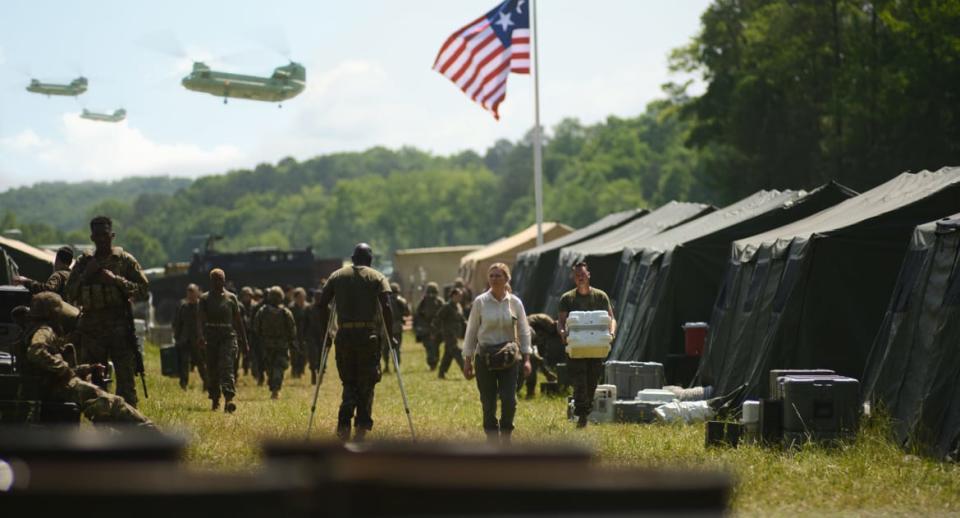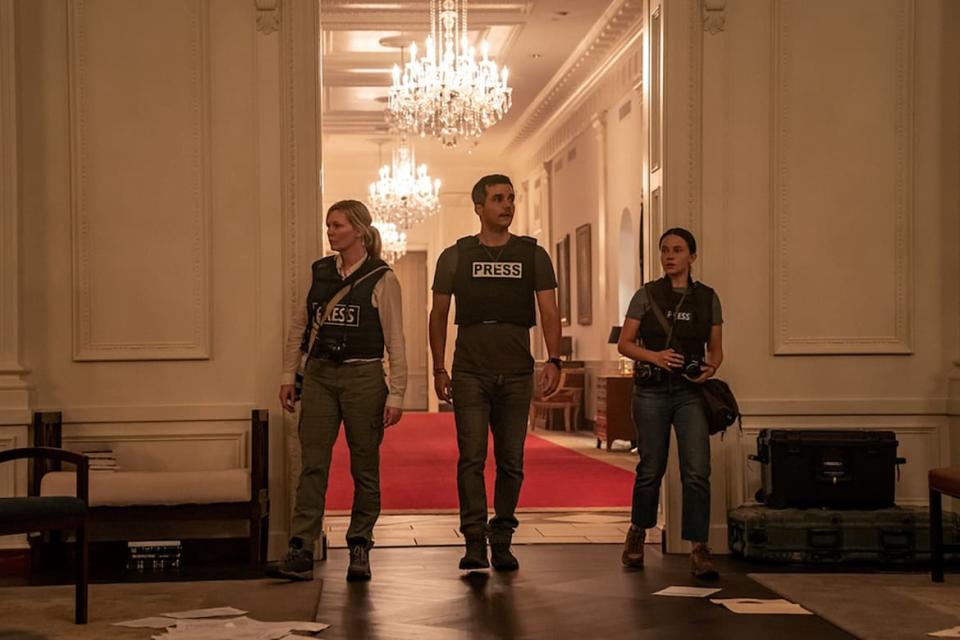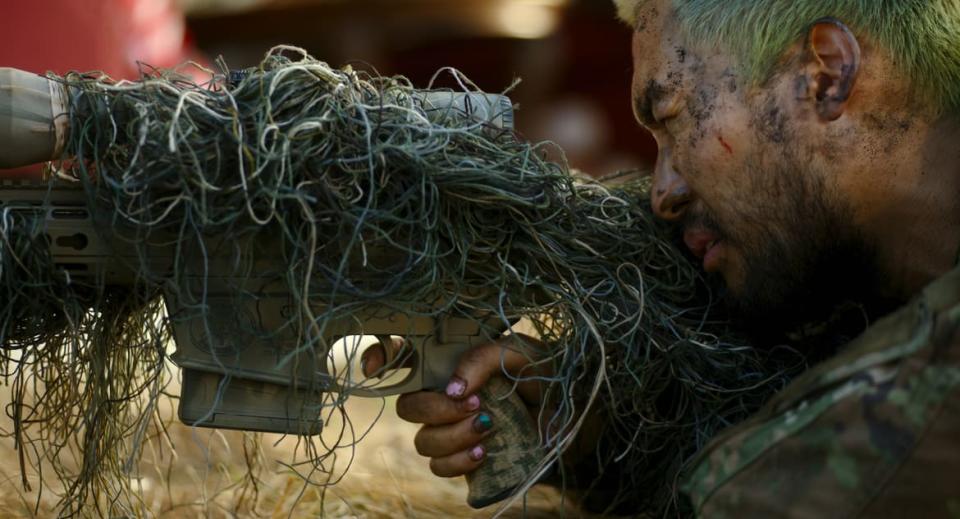Fox News Is Going to Have a Field Day With ‘Civil War’

With Civil War, Alex Garland made a film intended to provoke audiences into thinking about the state of the country. So naturally, I’m terrified.
“Thinking,” I’ve come to learn—especially when it comes to politically charged movies—tends to metastasize in today’s culture into “getting angry,” “baselessly ranting,” or, the most dreaded phrase on the internet, “igniting discourse.” It’s not that I fear debate or passionate difference of opinion. That’s the whole point of cultural consumption and certainly of criticism; disagreement should be a beautiful, natural byproduct of watching a film and discussing it with fellow enthusiasts. Mass agreement wouldn’t just be impossible, it would be incredibly boring too.
The issue is that discord in the year 2024, perhaps fitting for this particular movie, more resembles respective sides tossing grenades at each other rather than actually engaging with any cogent points or arguments. What I fear—and am preparing to be exasperated by when it comes to Civil War—is the bad-faith pontificating that has replaced thoughtful discussion.
There will be pundits condemning and dismissing the film because of how they interpret the politics. People on social media will post typically extremist reactions to it, whether or not they’ve seen the film (which, as Garland told my colleague Nick Schager, they’ve already done). And, the critical evolution that I most detest, the “I am right and you are wrong, and I will not entertain any nuance in the middle” crowd, will bully their opinions of the film, good or bad, with fingers in the ears refusing to hear, let alone acknowledge, any other side. (Beware of any post that begins, “I don’t see how anyone can think…”)

Kirsten Dunst
More than any recent film, Civil War, which is now in theaters, is fodder for these reactions.
The film takes place in the near future at the climax of a second American civil war. Polarization has already sent the country into violent ruin. An us vs. them mentality has left major cities as hotbeds of bombings and sniper warfare, while the roads and towns between them are dotted with bodies swinging from overpasses and mass graves. The president (Nick Offerman) is essentially a despot in his third term who has disbanded the FBI and orders that journalists at the White House be shot on sight.
The Western Forces alliance of California and Texas is gaining traction in its effort to seize the capital and assassinate the president, with the major battleground taking place in Charlottesville, Virginia—conspicuously where 2017’s deadly white supremacist rally took place. Kirsten Dunst and Wagner Moura play war reporters—she’s a famed photographer—who journey to D.C. to capture the melee. With each stop on the way, they bear witness to war-ravaged atrocities and extremism-pilled citizens, wondering what is the point of their career in journalism if their images and stories from decades of global strife did nothing to curb what is happening in their own country.
Alex Garland’s ‘Civil War’ Is an Explosive Warning Against a Trump Takeover
Garland, who wrote and directed Civil War, doesn’t poison the film with think-piece exposition, presumably not to sacrifice the project to immediate evisceration from one political party. The ideologies of the respective sides are never elucidated, and the California-Texas alliance makes it so an audience member can’t presume whether the Western Forces are the “good guys” or the “bad guys” based on easily classifiable ideologies. But the film isn’t apolitical by any means.
You don’t need to know what the political motivations of either side were prior to this civil war to know that the devastation is a byproduct of a hauntingly recognizable extremism. As the journalists road-trip to D.C., you are immersed inside the violence they experience. It’s not B-roll on the news. It is visceral. And a president who, somehow, amends the Constitution to make way for a third term, sows division in the country, and gets rid of the federal organization that serves as his check and balance… Who could that possibly remind anyone of?

Kirsten Dunst, Wagner Moura, and Cailee Spaeny
I’ve talked to several people and read some responses to early screenings of the film that have called it apolitical because the ideologies and the plot’s parallels to today’s climate aren’t made explicit. At a post-screening Q&A I attended, Garland expressed his confusion and frustration over that argument. Based on the plot description alone, how could you not think the film is political? He began writing it in 2020, during the period of disturbing division and unrest in this country, and observed as that continued up until its release today; early drafts of the script proved prescient as the Jan. 6 insurrection unfolded.
Obviously, then, Civil War is meant to provoke conversation, specifically surrounding the current, combustible state of our country. But I’m nervous that, instead, the tendencies toward histrionic debate will dismantle that conversation.
‘Civil War’ Director Alex Garland Isn’t Shocked by the Discourse
I can imagine the Fox News segments about it. Trump’s team is probably already drafting some Truth Social manifesto about it. (He’d done a similar thing prior to the release of 2020’s The Hunt, which Civil War has been compared to, after all.) What will social media be like after its release? As Vice reported in December, the trailer alone sparked conspiracy theorists to call the film an example of “predictive programming,” which, they argued, is “shadowy deep state elites using their control of the media to prepare the population for an actual civil war.”
Chill, normal stuff.

A scene from Civil War
Listen, I’m not always coherent and definitely don’t presume to be correct all the time in my opinions. I accidentally caught a glimpse of the eclipse before putting my special glasses on, and have been convinced that my brain has been partially fried since. (At least, that’s what I told myself when I accidentally poured Worcestershire instead of soy sauce on my dumplings earlier this week.) Maybe my thoughts are not reliable at the moment.
Still, I loved Civil War and found it to be a profound, unshakable warning about what may even be an inevitability, if the country continues like this. And I’ve talked to folks who disagree. Their opinions are interesting. Is either one of us right? Who’s to say.
It would be fascinating and of such a cultural benefit if there could be conversation about this film that was considered and cordial—you could say “civil,” even. But cynicism takes over; I’m bracing myself for when the discourse in the coming weeks most certainly is none of those things.
Get the Daily Beast's biggest scoops and scandals delivered right to your inbox. Sign up now.
Stay informed and gain unlimited access to the Daily Beast's unmatched reporting. Subscribe now.

 Yahoo Sports
Yahoo Sports 
